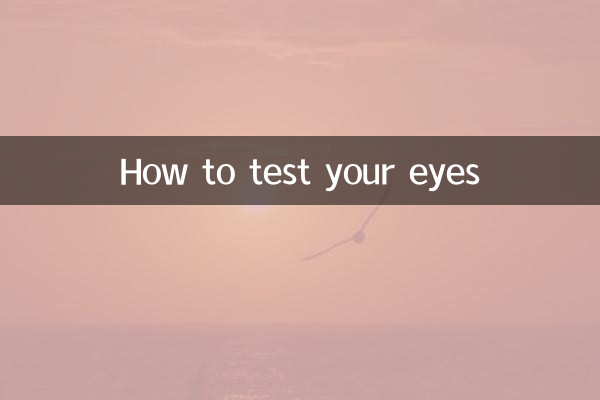How to do eye refraction: Comprehensive analysis of the optometry process and precautions
In today's society, with the popularity of electronic devices, vision problems have attracted increasing attention. Optometry, as an important means of testing vision, is a topic of concern to many people. This article will introduce the steps, methods and precautions of optometry in detail to help everyone better understand the optometry process.
1. Basic process of optometry

Optometry usually includes the following steps:
| steps | content |
|---|---|
| 1. Preliminary inspection | The doctor will ask about vision problems, medical history, and eye habits. |
| 2. Vision test | Test naked eye vision with an eye chart. |
| 3. Computerized optometry | Use a phoropter to initially measure the diopter. |
| 4. Comprehensive optometry | The best corrected visual acuity is determined by adjusting the trial film. |
| 5. Mydriatic refraction | Use mydriatic drops when necessary to eliminate the influence of accommodative myopia. |
| 6. Final confirmation | The doctor will prescribe glasses or recommend a treatment plan based on the results. |
2. Common methods of optometry
The following are several common optometry methods and their characteristics:
| method | Features | Applicable people |
|---|---|---|
| Computerized optometry | Fast and automated, but may contain errors. | Initial screening, adults and adolescents. |
| Comprehensive optometry | High accuracy and relies on the experience of the optometrist. | People who need precise vision correction. |
| Mydriatic refraction | Eliminate adjustment interference and the results are more accurate. | Children, teenagers and hyperopic patients. |
3. Precautions for optometry
In order to ensure the accuracy of the optometry results, you need to pay attention to the following points:
1.Preparation before optometry:Avoid excessive use of your eyes, especially do not look at electronic screens for long periods of time before an optometry test. If you need to undergo a dilated refraction, it is best to have someone accompany you as your vision will be temporarily blurred after your pupils are dilated.
2.Choose a formal institution:Optometry is a professional operation. It is recommended to choose a regular hospital or professional optical shop to avoid errors caused by improper operation.
3.Honest feedback:During the optometrist process, tell the optometrist truthfully how you feel, especially the clarity and comfort when trying on the lenses.
4.Regular review:Vision can change over time, especially in teenagers and older adults, and it is recommended to have an eye exam at least once a year.
4. The relationship between optometry and glasses
Optometry is the foundation of spectacles, and accurate optometry data is the key to successful spectacles. The following is the relationship between optometry and glasses:
| Optometry data | Optical applications |
|---|---|
| Spherical power (myopia/hyperopia) | Determine the basic power of the lens. |
| Cylinder power (astigmatism) | Determine the astigmatism correction portion of the lens. |
| Axial position (direction of astigmatism) | Determine the direction of astigmatism correction. |
| Interpupillary distance | Make sure the optical center of the lens is aligned with the pupil. |
5. Common Optometry Misunderstandings
1.Computerized optometry results can be directly used for glasses:Computerized refraction is only preliminary data and cannot be directly used for glasses. It needs to be confirmed with comprehensive refraction.
2.If you have good eyesight, you don’t need an optometry test:Even if your vision is good, regular eye exams can help detect potential problems, such as early presbyopia or astigmatism.
3.Optometry only needs to be tested once:Vision changes, especially in teenagers and older adults, and requires regular check-ups.
6. Summary
Optometry is an important part of vision health. Whether it is glasses or eye health examination, professional optometry support is needed. By understanding the optometry process, methods and precautions, you can better protect your eye health. It is recommended to have an optometry examination at least once a year, especially for teenagers and people who use their eyes for a long time.

check the details

check the details